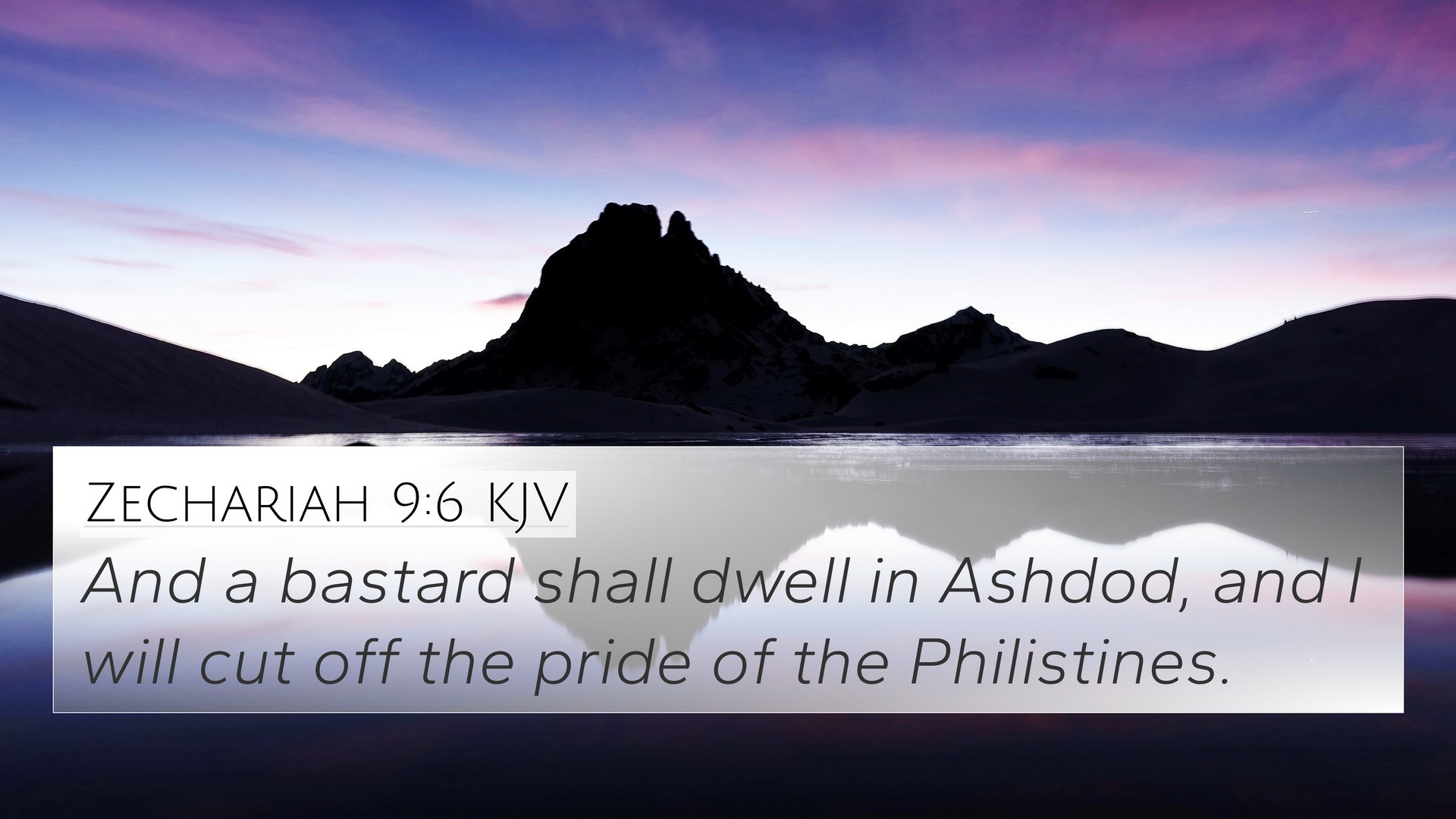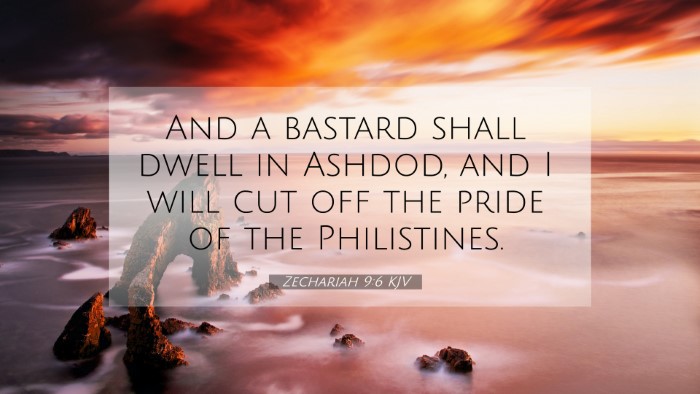Old Testament
Genesis Exodus Leviticus Numbers Deuteronomy Joshua Judges Ruth 1 Samuel 2 Samuel 1 Kings 2 Kings 1 Chronicles 2 Chronicles Ezra Nehemiah Esther Job Psalms Proverbs Ecclesiastes Song of Solomon Isaiah Jeremiah Lamentations Ezekiel Daniel Hosea Joel Amos Obadiah Jonah Micah Nahum Habakkuk Zephaniah Haggai Zechariah MalachiZechariah 9:6 Similar Verses
Zechariah 9:6 Cross References
And a bastard shall dwell in Ashdod, and I will cut off the pride of the Philistines.
Uncover the Rich Themes and Topics of This Bible Verse
Listed below are the Bible themes associated with Zechariah 9:6. We invite you to explore each theme to gain deeper insights into the Scriptures.
Zechariah 9:6 Cross Reference Verses
This section features a detailed cross-reference designed to enrich your understanding of the Scriptures. Below, you will find carefully selected verses that echo the themes and teachings related to Zechariah 9:6 KJV. Click on any image to explore detailed analyses of related Bible verses and uncover deeper theological insights.
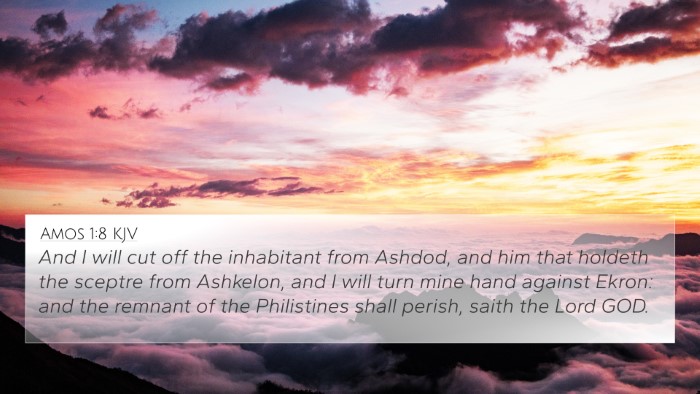
Amos 1:8 (KJV) »
And I will cut off the inhabitant from Ashdod, and him that holdeth the sceptre from Ashkelon, and I will turn mine hand against Ekron: and the remnant of the Philistines shall perish, saith the Lord GOD.

Ecclesiastes 6:2 (KJV) »
A man to whom God hath given riches, wealth, and honour, so that he wanteth nothing for his soul of all that he desireth, yet God giveth him not power to eat thereof, but a stranger eateth it: this is vanity, and it is an evil disease.

Ecclesiastes 2:18 (KJV) »
Yea, I hated all my labour which I had taken under the sun: because I should leave it unto the man that shall be after me.
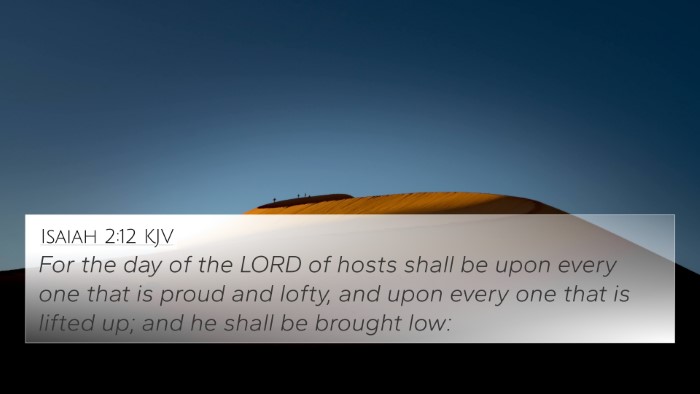
Isaiah 2:12 (KJV) »
For the day of the LORD of hosts shall be upon every one that is proud and lofty, and upon every one that is lifted up; and he shall be brought low:

Isaiah 23:9 (KJV) »
The LORD of hosts hath purposed it, to stain the pride of all glory, and to bring into contempt all the honourable of the earth.

Isaiah 28:1 (KJV) »
Woe to the crown of pride, to the drunkards of Ephraim, whose glorious beauty is a fading flower, which are on the head of the fat valleys of them that are overcome with wine!
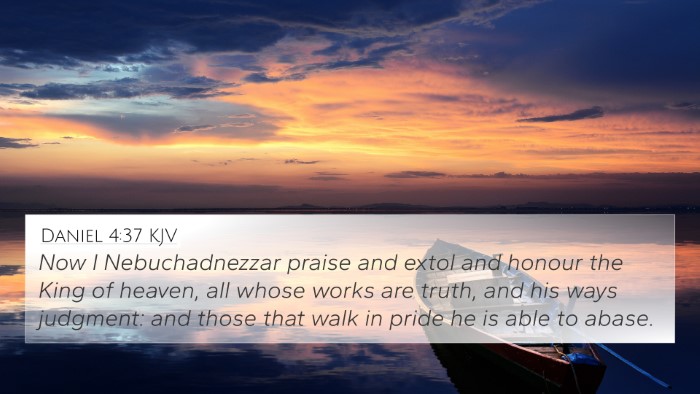
Daniel 4:37 (KJV) »
Now I Nebuchadnezzar praise and extol and honour the King of heaven, all whose works are truth, and his ways judgment: and those that walk in pride he is able to abase.
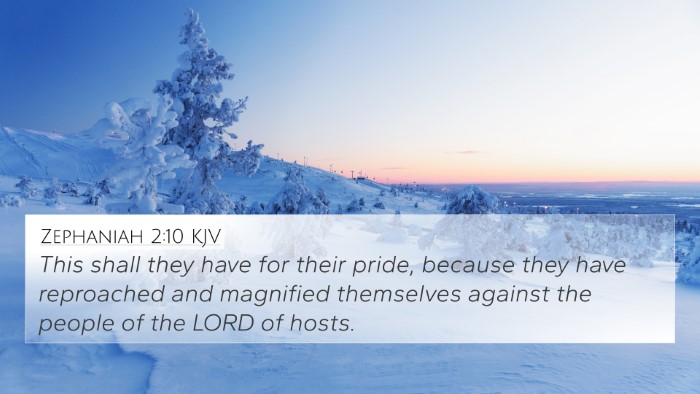
Zephaniah 2:10 (KJV) »
This shall they have for their pride, because they have reproached and magnified themselves against the people of the LORD of hosts.

1 Peter 5:5 (KJV) »
Likewise, ye younger, submit yourselves unto the elder. Yea, all of you be subject one to another, and be clothed with humility: for God resisteth the proud, and giveth grace to the humble.
Zechariah 9:6 Verse Analysis and Similar Verses
Understanding Zechariah 9:6
Verse: "And a bastard shall dwell in Ashdod, and I will cut off the pride of the Philistines."
This verse from Zechariah 9:6 carries significant meaning regarding God’s judgment and the fate of nations. Here, we will explore the insights provided by renowned public domain commentaries including those by Matthew Henry, Albert Barnes, and Adam Clarke.
Contextual Overview
This scripture is situated within a prophetic oracle concerning the future of Israel and judgment against its enemies. Zechariah's prophecies often encompass themes of restoration and judgment, particularly focusing on the people of God amidst surrounding nations.
Commentary Insights
Matthew Henry’s Commentary
Matthew Henry expounds on this verse noting that the term "bastard" signifies illegitimacy and indicates the presence of those within Ashdod (a Philistine city) who have no rightful claim to God’s blessing. The pride of the Philistines, characterized by their idol worship and defiance against God's people, will be cut off. This points to a divine intervention against those who oppose His plans, emphasizing God’s sovereignty.
Albert Barnes’ Notes
Barnes elaborates that the specific mention of Ashdod—a major Philistine city—highlights the fate of these people as God cuts off their pride. By using the phrase "I will cut off," we see the definitive action of God against idolatry and unfaithfulness. This also serves as a reminder to the Israelites of the consequences of pride, drawing a stark contrast between the blessings for the faithful and the doom for those acting against God's will.
Adam Clarke’s Commentary
Clarke interprets the verse as a prophetic warning that even those in power and pride, such as the Philistines, will be humbled. He connects this scripture to God’s overarching plan of redemption and divine justice. Ashdod symbolizes the corruption stemming from idolatry, and the mention of cutting off suggests a decisive movement toward purity among God's chosen people.
Thematic Connections with Other Scripture
Zechariah 9:6 establishes a theme that resonates throughout the Bible, allowing us to examine Bible verse cross-references to deepen our understanding:
- Isaiah 14:29: Speaks of the destruction of the Philistines and their troubling pride.
- Amos 1:8: Foretells the judgment on the cities of Philistia.
- Jeremiah 47:1-7: Discusses the impending judgment on Philistia.
- Psalm 37:20: Illustrates the fate of the wicked and prideful.
- Ezekiel 25:15-17: The Lord’s declaration against Philistia is made evident.
- Micah 5:6: Refers to the devastation set upon nations not aligned with God.
- Zechariah 9:5: Directly leads into the discussion about Ashdod and pride.
Inter-Biblical Dialogue
The discussions surrounding Zechariah 9:6 offer a glimpse into the interconnectedness of Biblical texts. This verse serves as a bridge between themes of judgment and restoration, showcasing God’s enduring commitment to His people through both punishment of sin and ultimate redemption.
Cross-Referencing Insights
Utilizing cross-referencing Bible study methods engages readers in exploring similar scriptures, enhancing their understanding of divine principles:
- Engaging with the narratives in the Old Testament and their connections to New Testament teachings.
- Identifying connections based on thematic concerns, such as pride and divine judgment.
- Exploring the detailed cross-reference between Gospels, particularly the connections made in Jesus’ teachings regarding humility.
- Looking into comparative studies of Pauline epistles that reflect on themes of pride and humility.
Conclusion
Zechariah 9:6 not only promises judgment against the prideful nations but emphasizes God’s protection over His people. Through comparative analysis and cross-referencing, we gain deeper insights into the nature of God's interactions with humanity, affirming the relevance of these Scriptures in understanding divine sovereignty and justice.
For those seeking to enhance their study of the Bible, employing a Bible cross-reference guide can uncover new layers of meaning and facilitate a profound understanding of scripture. Using these tools for Bible cross-referencing, one can easily identify Bible verses that relate to each other and develop a comprehensive understanding of theological themes.
